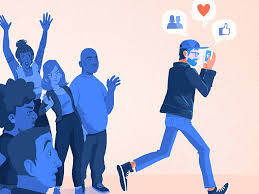
Social media has become a vital part of daily life for many individuals, especially youth. Platforms such as Instagram, X, Facebook and TikTok give people easily accessible opportunities for communication and connection. However, as useful as social media can be in fostering connection and communicating with others, there has been an increasing concern about the potentially isolating effects of social media on youth. The reason being that social media takes away opportunities to meet in person and have face-to-face contact with others, thus leading to social isolation. There is a huge variety of positive and negative impacts social media has on an individual’s social and emotional well-being, which is why it is so important to educate oneself on what those effects might be and how to find a balance between using social media and promoting emotional well-being.
Positive Effects
When social media is used responsibly and thoughtfully, it can be an extremely useful tool in young people’s social lives. Some of these ways are through text messages and videos that can be sent to others through social media apps. It is also very common for young people, such as teens, to create group chats on these social media platforms, which can create feelings of inclusion and belonging. Finding online communities where an individual feels accepted and understood can boost confidence, especially for those who have difficulty forming genuine relationships in person. There are also platforms where individuals can share their interests or passions, and possibly find work or education opportunities. Along with this, many youths with large followings on social media can actually get paid for their posts highlighted brands in their posts.
Negative Effects
Despite its benefits, social media can also have negative effects on individuals, both physically and emotionally. One of the major ways this can happen is if social media is used so frequently that it replaces face-to-face communication. Without in-person interactions, social relationships suffer. This is because it is nearly impossible for people to develop certain social skills, such as nonverbal communication and empathy, when all or most meaningful relationships are via social media. Furthermore, unhealthy use of social media can lead to distractions from homework and a lack of sleep, which contributes to negative physical health effects, as well. There is also the threat of social isolation because, even though these young individuals are communicating with their peers, they may still feel lonely or isolated when the in-person aspect is taken out of the equation.
There are many other ways that social media leads to social isolation. For instance, social media can create unrealistic expectations or comparisons that youth are especially vulnerable to. The pressure that comes from social media to replicate the idealized versions of other people’s lives, usually strangers, can create feelings of being inadequate. When young individuals give into these feelings that other people’s lives are “so much better,” they may experience negative effects on their self-esteem and confidence, which may further contribute to feeling disconnected from their peers and socially isolated. There is also the issue of cyberbullying, that can be found on various social media platforms. Online bullying can follow a person everywhere, making it harder to ignore, and may lead to youth retreating from all online and in-person interactions. As a result, this withdrawal leads to complete isolation and an entire avoidance of connections and relationships.
Social Validation
The desire to belong and the fear of missing out, commonly known as “FOMO,” can leave individuals feeling disconnected or excluded if they see their peers at a gathering or event on social media that they were not invited to. Watching their friends participating in activities, having fun without them, can lead to feelings of isolation and loneliness. This social validation is also evident in how users constantly seek comments, shares, likes, etc., through their social media posts to feel like they are special or loved. For youths, the number of likes they get on a post often equates to their social worth. This quest for validation can negatively impact an individual’s sense of identity; therefore, the more importance they put on seeking this validation, the more time they spend trying to perfect their online image rather than focusing on real-world interactions and relationships. Concentrating so much on one’s image rather than being who they actually are leads to feeling lost and as if nobody truly knows them, taking away from the whole point of using social media to create meaningful relationships.
Finding a Balance
It is important to find a balance between the use of social media and in-person interactions. Parents and youth are recommended to manage screen time to ensure that social media does not “take over” their lives and that there is still time to have face-to-face socialization. It is also important to have conversations about the realities of social media, including the good and bad aspects of it. Engaging in these discussions can promote emotional well-being and ensure that young individuals know that they have people in their lives to turn to if they are ever suffering from the negative impacts of social media. In addition, these conversations ensure the youth are equipped with the necessary tools for navigating social media platforms and mitigating harmful effects, especially cyberbullying and privacy concerns. It is important for individuals and society as a whole to address the issues that come with social media use, to find better solutions.
Sources:
